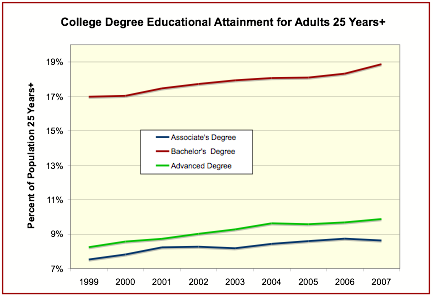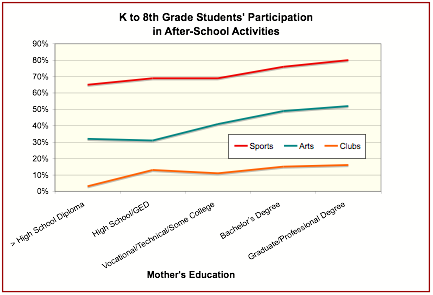
Vol. IX, No. 2, March 2009
- Editor's Corner
- Demise of the stuffed; birth of the grounded consumer
- Children's edutainment and enrichment in an educated society
- Foundations Entertainment University, May 5-7, Kansas City, Missouri
- Affordable out-of-home entertainment still strong
- Scheels retail-tainment
- The real impact of go-karts on your bottom line -- and how to improve it!
- Smashies from the space program
Children's edutainment and enrichment in an educated society
The U.S. is steadily becoming a more educated society, and that fact has important implications for location-based entertainment venues. Parents are increasingly favoring children's entertainment that includes learning experiences over mindless amusement. Find out how to make your offerings appeal to these key consumers.
America is becoming more educated, as are many other areas of the world. Between 1999 and 2007, the percentage of U.S. adults 25 years and younger with a college degree increased by one-seventh. In 2007, over one-third of adults 25 years and older had an associate, bachelor's or more advanced college degree.

Since 1940, the proportion of the adult population that graduated from high school has more than tripled (now 85%), and the number with a bachelor's or higher college degree increased sixfold.
A more educated society has important implications to location-based entertainment (LBE). It means a large segment of the potential market of guests value knowledge and enrichment. Educated adults have an increased desire for lifelong learning and self-improvement. Instead of just wanting purposeless or mindless relaxation and entertainment, a large percentage of people want to use their highly valued leisure time not just for a respite, but also as an opportunity to improve themselves and their children.
At least for college-educated households, entertainment that includes an educational element is more valued than mindless amusement. This trend has led to the increased popularity of museums, zoos, aquariums, botanical gardens, historic attractions and other cultural institutions, some of which are now for-profit businesses. From 1999 to 2007, spending at museums and historical attractions rose 49%, far faster than inflation at 24% and entertainment spending at venues such as theme and amusement parks and bowling centers (41% and 37%, respectively). This faster rising educationally-oriented spending at out-of-home leisure venues basically parallels the increasing rate of those achieving college educations.
Our research in the earlier article in this eNewsletter, Demise of the stuffed; birth of the grounded consumer, shows education will take on even greater importance in the post-recession society.
For-profit children's edutainment centers (play and discovery centers) and children's enrichment centers offering classes and workshops are growing in popularity as the result of an increasingly educated and education-seeking society. Parents today are especially eager to expose their children to enriching experiences and every possible opportunity for learning and achievement.
BSM Media's January 2009 survey of 1,400 mothers by race confirms parents strong desire to support their children's education. CEO Maria Bailey said, "Moms across racial lines ranked education as their greatest dream for their children."
There is strong evidence that parents with the most education have the strongest interest in seeing their children attend enriching programs. Data from 2005 on participation in after-school activities by kindergarten to eighth graders shows the higher the education level of the mother, the higher the rate of the child's participation.

Our company has been very active in the design and development of children's edutainment and enrichment centers. We pioneered the children's edutainment center concept in the United States in 1997 with Bamboola in California, which was evolved from children's edutainment areas we developed several years earlier in two centers in Latin America. Our most recent children's edutainment center, BellaBoo's, developed for the Lake Country (Indiana) Parks Department, is set to open later this spring.
The demand for children's edutainment and enrichment is not just an American phenomenon. We are seeing strong interest in Asia and the Middle East. In the Middle East, there is strong demand for children's edutainment centers. This is due not only to an educated population, but to the desire of shopping center and mall developers to differentiate their projects from stereotypical family entertainment centers (FECs). Parents, many of whom are expatriates from Western countries, are looking for opportunities to advance their children's education beyond what is offered in school by having their kids attend children's enrichment workshop classes.
We just finished the initial concept development and design stage for the Children's Academy to be located in the new Stargate project in Dubai. It will have 11 different specialized workshop labs (classrooms) that offer children's cooking, pottery, papermaking, robotics, astronomy, digital (movies, games, graphics, music, websites, etc.) and other specialized classes. The Academy is being designed to offer scheduled classes, walk-in classes and school fieldtrips. We have also been working on feasibility and design for a larger edutainment center for children in Kuwait. It plans to offer 24 different children's edutainment activities as well as dedicated specialized workshop labs for children's classes.
New concepts for children's edutainment are evolving in the United States. We just began work on a new, innovative concept center in California. "Innovative" can be a dangerous word, as innovation does not necessarily translate to financial success. However, based on our 20 years of experience in the children's entertainment and edutainment field, we believe that by the time we perfect the concept for our client, this one will be a homerun and take people by surprise, as in, "Gee, why didn't I think of that?"
Vol. IX, No. 2, March 2009
- Editor's Corner
- Demise of the stuffed; birth of the grounded consumer
- Children's edutainment and enrichment in an educated society
- Foundations Entertainment University, May 5-7, Kansas City, Missouri
- Affordable out-of-home entertainment still strong
- Scheels retail-tainment
- The real impact of go-karts on your bottom line -- and how to improve it!
- Smashies from the space program


